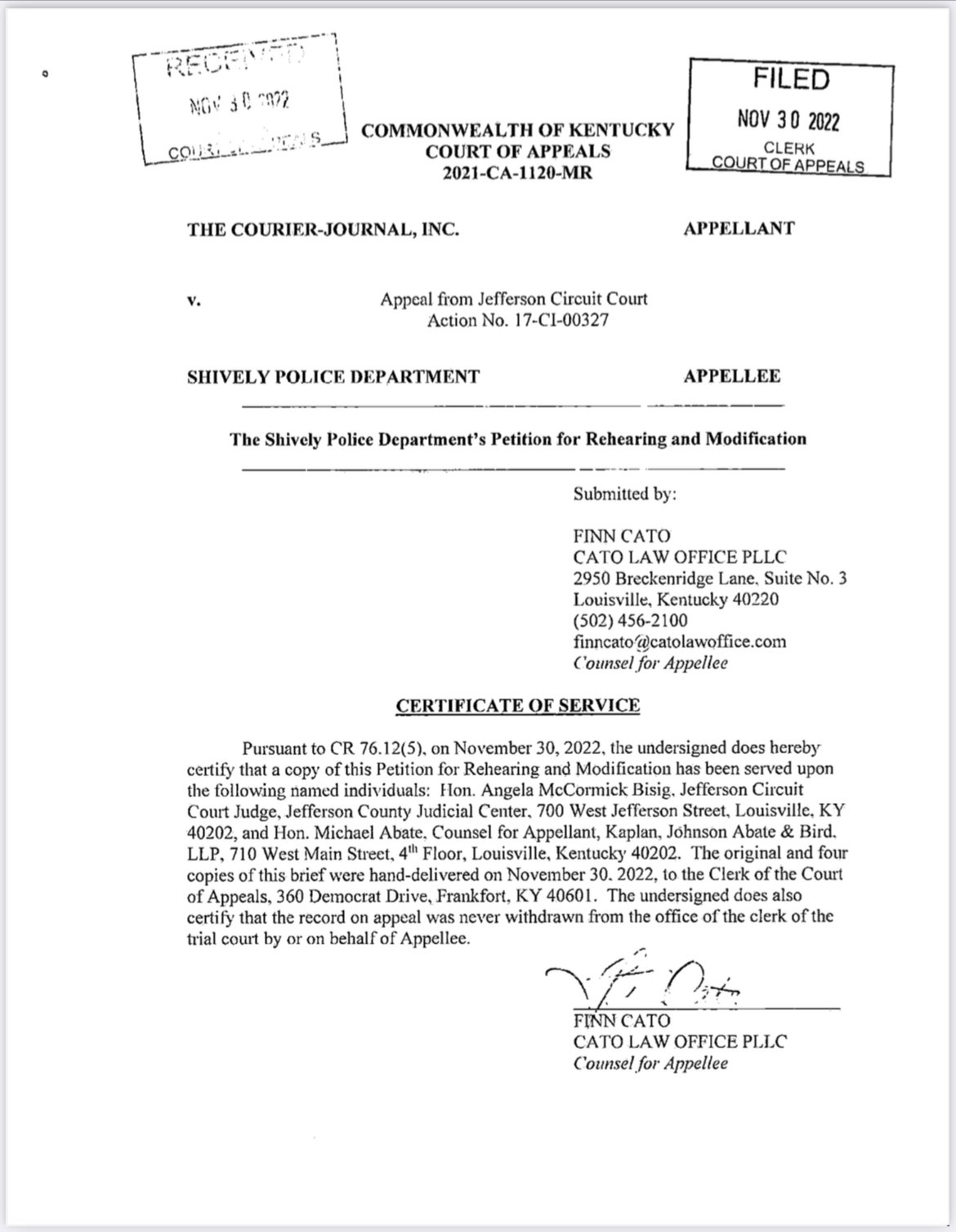
To no one's great surprise, the Shively Police Department filed a Petition for Rehearing and Modification in Courier Journal v Shively Police Department on November 30.
The underlying published opinion, issued by the Court of Appeals on November 10, dramatically altered the open records landscape by divesting law enforcement agencies of the ability to withhold all records in open investigations under KRS 17.150(2) absent a showing of actual concrete harm to the investigation or enforcement action from premature disclosure of records or categories of records required under KRS 61.878(1)(h).
https://caselaw.findlaw.com/ky-supreme-court/1643297.html
In Courier Journal v Shively Police Department, the Court of Appeals repudiated Shively’s reliance on KRS 17.150(2) to “essentially swallow[ ] up the limitations contained in the KRS 61.878(1)(h) exemption.”
The court observed,
"KRS 17.150(2) provides for the complete disclosure of intelligence and investigative reports maintained by criminal justice agencies after prosecution is complete, subject to four specific exemptions. Therefore, KRS 17.150(2) should only apply if the conditions set out in its prefatory language are met. There is no reaching the exceptions where a determination to prosecute has been made and the prosecution is not yet completed.”
"Simply put," we wrote earlier this month, "KRS 17.150(2) is a disclosure statute, with exceptions, that applies after prosecution is complete. It is not a nondisclosure statute and does not apply while the investigation/enforcement action is ongoing."
https://kyopengov.org/blog/kentucky-court-appeals-opinion-rejects-law-e…
In its petition, the Shively Police Department argues:
"The Courier Journal has advocated that KRS 17.150(2) by its plain terms applies only to investigations that have concluded.
"However, SPD, along with other law enforcement agencies across the Commonwealth disagree with the Courier Joumal’s interpretation of this statute. Nevertheless, the Courier Journal has acknowledged that it is just that . . . its own interpretation of the statute but also acknowledges and recognized that in recent years the Kentucky Attorney General’s Office does not share the Courier Journal’s interpretation.
[As indicated in the Coalition's November 11 post about this case, there was substantially less that unanimous agreement within the Attorney General's office on the correct interpretation of KRS 17.150(2). This was, in fact, one of the most contentious issues in the office, pitting the judgment of administrative staff against the judgment of career staff on multiple occasions.]
"SPD exhorts that KRS 17.150(2) should be understood and enforced as it plainly reads and not as a matter of statutory interpretation. The statute speaks for itself.
"This Court however has seemingly adopted the Courier Joumal’s interpretation of KRS 17 150(2) and SPD respectfully requests that this Court grant a rehearing on this matter because of any misconceptions that may have arisen with regard to these two statutes and the enormous implications that this Court's opinion will have on criminal Justice and law enforcement agencies in the Commonwealth of Kentucky."
"One of the main issues with the release of records," Shively argues, "would be the harm it might cause by premature release in a prospective law enforcement action."
Embedded in this “issue” is it's own solution. If harm from premature disclosure of a record or records in an open investigation or enforcement action can be demonstrated, the law enforcement agency may properly invoke KRS 61.878(1)(h). It is only where no harm can be demonstrated that law enforcement agencies must disclose a record or records in an open investigation.
What’s the harm?
The Coalition, as well — no doubt — as the parties, anxiously await action by the Court of Appeals on the Shively Police Department’s petition.



